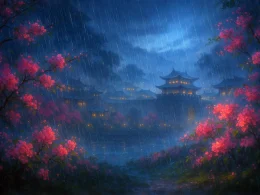Bamboo from the southern hills was used to make this pipe.
And its music, that was introduced from Persia first of all,
Has taken on new magic through later use in China.
And now the Tartar from Liang-chou, blowing it for me,
Drawing a sigh from whosoever hears it,
Is bringing to a wanderer's eyes homesick tears.
Many like to listen; but few understand.
To and fro at will there's a long wind flying,
Dry mulberry-trees, old cypresses, trembling in its chill.
There are nine baby phrenixes, outcrying one another;
A dragon and a tiger spring up at the same moment;
Then in a hundred waterfalls ten thousand songs of autumn
Are suddenly changing to The Yu-yang Lament;
And when yellow clouds grow thin and the white sun darkens,
They are changing still again to Spring in the Willow-Trees.
Like Imperial Garden flowers, brightening the eye with beauty,
Are the high-hall candles we have lighted this cold night,
And with every cup of wine goes another round of music.
Original Poem
「听安万善吹觱篥歌」
李颀
南山截竹为觱篥,此乐本自龟兹出。
流传汉地曲转奇,凉州胡人为我吹。
傍邻闻者多叹息,远客思乡皆泪垂。
世人解听不解赏,长飙风中自来往。
枯桑老柏寒飕飗,九雏鸣凤乱啾啾。
龙吟虎啸一时发,万籁百泉相与秋。
忽然更作《渔阳掺》,黄云萧条白日暗。
变调如闻杨柳春,上林繁花照眼新。
岁夜高堂列明烛,美酒一杯声一曲。
Interpretation
This poem is a famous work by Tang dynasty poet Li Qi depicting a performance on the bìlì (觱篥), a pipe instrument originally introduced from Qiuci (龟兹 Qiūcí, present-day Kuqa in Xinjiang) in the Western Regions to central China, which was highly esteemed in Tang musical circles. With delicate brushstrokes, the poet captures the intricate variations of the music and the emotions it evokes, while expressing lamentations about the rarity of true connoisseurs and showcasing his own exceptional musical discernment.
First Couplet: "南山截竹为觱篥,此乐本自龟兹出。"
Nán shān jié zhú wéi bìlì, cǐ yuè běn zì Qiūcí chū.
Bamboo from South Mountain is cut to make the bìlì; This music originally came from Qiuci.
The poet establishes the instrument's material and origin, highlighting its exotic characteristics as background for the entire poem.
Second Couplet: "流传汉地曲转奇,凉州胡人为我吹。"
Liú chuán Hàn dì qǔ zhuǎn qí, Liángzhōu hú rén wéi wǒ chuī.
After spreading to Han territories, its melodies grew wondrous; A Western musician from Liangzhou plays it for me.
Shows how the bìlì's tunes became more complex and exquisite after entering central China, while identifying the performer's origin to reinforce the Western music's exotic flavor.
Third Couplet: "傍邻闻者多叹息,远客思乡皆泪垂。"
Bàng lín wén zhě duō tànxī, yuǎn kè sī xiāng jiē lèi chuí.
Neighbors who hear it sigh deeply; Travelers from afar shed homesick tears.
The bìlì's melodies resonate emotionally, particularly stirring wanderers' nostalgia, demonstrating its profoundly moving power.
Fourth Couplet: "世人解听不解赏,长飙风中自来往。"
Shì rén jiě tīng bù jiě shǎng, cháng biāo fēng zhōng zì lái wǎng.
The world understands how to listen but not appreciate; My soul drifts alone like an eternal gale.
The poet regrets that people only respond to the music's surface emotions without comprehending its deeper essence, expressing the rarity of true connoisseurs.
Fifth Couplet: "枯桑老柏寒飕飗,九雏鸣凤乱啾啾。"
Kū sāng lǎo bǎi hán sōu liú, jiǔ chú míng fèng luàn jiū jiū.
Withered mulberries and ancient cypresses whistle in cold winds; Nine phoenix chicks cry in chaotic chirps.
Vivid metaphors portray the music's desolate and variable qualities, intensifying its artistic conception.
Sixth Couplet: "龙吟虎啸一时发,万籁百泉相与秋。"
Lóng yín hǔ xiào yī shí fā, wàn lài bǎi quán xiāng yǔ qiū.
Like simultaneous dragon hums and tiger roars; All sounds and a hundred springs echo autumn's austerity.
Majestic imagery depicts the music's grandeur and dramatic fluctuations.
Seventh Couplet: "忽然更作《渔阳掺》,黄云萧条白日暗。"
Hū rán gèng zuò "Yúyáng càn", huáng yún xiāo tiáo bái rì àn.
Suddenly shifting to "The Yuyang Blend": Yellow clouds loom bleakly, daylight darkens.
"Yuyang Blend" is a solemn, stirring melody that creates a war-torn atmosphere, enhancing the music's tragic grandeur.
Eighth Couplet: "变调如闻杨柳春,上林繁花照眼新。"
Biàn diào rú wén yáng liǔ chūn, Shànglín fán huā zhào yǎn xīn.
The variation sounds like spring willows whispering; Shanglin Garden's blooming flowers dazzle anew.
The transition from solemnity to brightness displays the performer's superb skill and the poet's emotional transformation.
Ninth Couplet: "岁夜高堂列明烛,美酒一杯声一曲。"
Suì yè gāo táng liè míng zhú, měi jiǔ yī bēi shēng yī qǔ.
New Year's Eve in the grand hall with bright candles; Each cup of fine wine accompanies a musical piece.
The joyful conclusion shows the poet's musical intoxication, mirroring the earlier emotional transitions.
Overall Appreciation
This poem vividly portrays a bìlì performance while conveying profound reflections through musical variations. The first half progresses from the instrument's crafting, origin, and performer to listeners' reactions, demonstrating the music's emotional power. Yet the poet laments that people only hear without truly appreciating, echoing the difficulty of finding kindred spirits. The latter half emphasizes the music's grandeur and modulations through imagery of withered trees, phoenixes, dragon hums and tiger roars, then shifts from the solemn "Yuyang Blend" to the radiant "Willow Spring," showcasing dramatic artistic tension. The New Year's Eve finale reveals the poet's musical rapture while affirming music's ultimate purpose - spiritual solace.
Writing Characteristics
- Emotion-Scene Fusion: Through musical description, the poet projects his lament about rare connoisseurs, making the portrayal not just objective but deeply personal.
- Clear Progression with Rhythmic Variation: The first half shows the music's dissemination and emotional impact; the middle uses metaphors for its majestic power; the latter half presents melodic transitions culminating in joyful scenes, creating striking contrasts.
- Vivid Metaphors and Rich Imagery: Comparisons like "dragon hums and tiger roars" or "bleak yellow clouds" depict solemn grandeur, while "spring willows" and "blooming flowers" convey radiant lightness, creating strong visuality.
- Musical Expression of Ideals: While ostensibly about music, the poem actually expresses the poet's discernment and loneliness in lacking true peers, contrasting sharply with ordinary listeners and implicitly yearning for intellectual companionship.
Insights
This poem not only reflects Tang musical culture's vibrancy but contains profound life philosophy. Through the bìlì's dramatic variations, the poet projects his lament about rare connoisseurs while emphasizing that true art requires understanding its essence beyond superficial pleasure. This reminds us that in life, we must appreciate things' intrinsic beauty beyond their appearance. Moreover, the implied "loneliness at the top" message invites reflection - true talent often lacks recognition, yet one should persist without self-doubt due to worldly ignorance.
Poem translator
Kiang Kanghu
About the Poet

Li Qi (c. 690 - 753 AD) . A renowned Tang dynasty poet, Li Qi traced his ancestral roots to Zhao Commandery (present-day Zhao County, Hebei) but resided primarily in Yingyang (modern Dengfeng, Henan). Li Qi excelled in five- and seven-character verse forms, particularly frontier poems and musical poetry. He maintained close friendships with literary giants like Wang Wei, Gao Shi, and Wang Changling, later being grouped with them as one of the "Four Masters of High Tang" (Gao, Cen, Wang, and Li).











